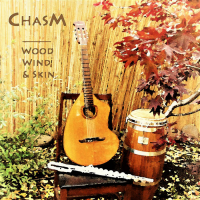Home » Jazz Articles » Bailey's Bundles » Harry Allen: Tenor Saxophone In The Time of COVID
Harry Allen: Tenor Saxophone In The Time of COVID
 Harry Allen
Harry Allen The Bloody Happy Song
GAC Records
2020
Warding off cabin fever early in the COVID-19 pandemic lockdown, tenor saxophonist Harry Allen hunkered in his living room with some new recording equipment and computer software, creating a virtual jazz recital featuring several different formats, from solo saxophone to big band. Allen had previously been planning a solo saxophone recording to be produced at his home before the pandemic kicked in and had already begun assembling the necessary equipment. The pandemic pushed the project to fruition. As such, Allen was in charge of the whole shooting match: performing, arranging, producing, engineering, and mastering the final product, as well as composing two of the selections presented.
Allen presents himself with different sized virtual ensembles (for which he composed each part electronically). His original, "The Bloody Happy Song," is treated with up-tempo, big band swing accompaniment, which the saxophonist capably scores with with an ear equally in the arenas of Benny Goodman and Stan Kenton. Allen's other original, "Sweet Little Things," is provided the same crack arranging and format, but at a lazy ballad tempo, allowing Allen a relaxed soloing environment, one that extends into the small combo treatment of "I Got Lost In His Arms." Allen's larger group performance of "Too Close For Comfort" proves his coy sense of humor regarding the pandemic and his place in it.
Allen performs solo on Michel Legrand's "The Summer Knows" and the Duke Ellington/Billy Strayhorn composition, "The Single Petal Of A Rose." He is at once provocative and predictable in the sense that these are well-worn songs he is breathing a different, even more vital, life into. Allen's keen ear for lyricism is displayed freshly and unadorned, allowing a full appreciation of his considerable talent. Harry Allen is a keeper of the flame of traditional, mainstream jazz, making no apologies for being so.
 Under A Blanket Of Blue
Under A Blanket Of Blue GAC Records
2020
Conceived from the same stressors catalyzing The Bloody Happy Song, Under A Blanket Of Blue added an additional level of complexity and challenge to the new COVID conception-production paradigm. In this case, Allen had been touring Europe with France-based, Australian guitarist Dave Blenkhorn in March 2020, when Allen received a telephone call from his wife, summoning him home due to the COVID travel ban to be instituted two days hence. Allen went home with a conversation he had with the guitarist in mind regarding recording at home ringing in his ears. So, with both musicians secure in their respective homes in New York City and Bordeaux, France, they recorded a collection of nine standards and one original (Allen's "The Bloody Happy Song" from the previous review) over a two-month period, working on one or two songs per week.
The two artists took a queue from classical music period performance specialists, deciding to go old school instrument and recording-wise. Allen recorded performing on a 1938 Selmer Balanced Action tenor saxophone captured through a Royer R10 ribbon microphone, while Blenkhorn used a 1958 Gibson 175 model guitar. A Django Reinhardt enthusiast, Blenkhorn brought a 1920 "Hot Club" vintage sound to the performances while maintaining Joe Pass-inspired walking-bass figures interspersed among his tasteful chording. That guitar environment proved to be money for Allen, who played at the top of his form..
Novel conception and recording method apart, the musical duet is the most intimate performance setting. It requires that two individuals cooperate and coalesce artistically, creating something not heard before. Sure, all of the songs in this recital have been performed and recorded every which way, some many times, before. But these songs as presented by Harry Allen and Dave Blenkhorn re freshly minted That alone makes them special, unique. Casual and close, the two musicians bring music together from across an open.
The repertoire is tried and true, with the closing songs defining the collection: Victor Young's 1932 "Street of Dreams" receives a breezy introduction from Blenkhorn before assimilating a first timid Allen into its confines. The song gathers swing density ending on a well conceived coda. Charles Trenet's "La Mer" (Columbia, 1946) bounces with tuneful glee, with Allen gently coaxing the melody through the harmonic underpinning provided by Blenkhorn's guitar. Jimmy Van Heusen's "Imagination" rubs its baladic backside against Allen's original "The Bloody Happy Song" reprised here from the same-titled recording above. The two end with an introverted performance of Duke Ellington "Solitude," proving again that the Great American Songbook continue tp provide an endless source of inspiration.
Tags
Bailey's Bundles
Harry Allen
C. Michael Bailey
United States
Benny Goodman
Stan Kenton
Michel Legrand
duke ellington
Billy Strayhorn
Dave Blenkhorn
Joe Pass
Victor Young
Charles Trenet
Jimmy Van Heusen
PREVIOUS / NEXT
Support All About Jazz
 All About Jazz has been a pillar of jazz since 1995, championing it as an art form and, more importantly, supporting the musicians who make it. Our enduring commitment has made "AAJ" one of the most culturally important websites of its kind, read by hundreds of thousands of fans, musicians and industry figures every month.
All About Jazz has been a pillar of jazz since 1995, championing it as an art form and, more importantly, supporting the musicians who make it. Our enduring commitment has made "AAJ" one of the most culturally important websites of its kind, read by hundreds of thousands of fans, musicians and industry figures every month.





















